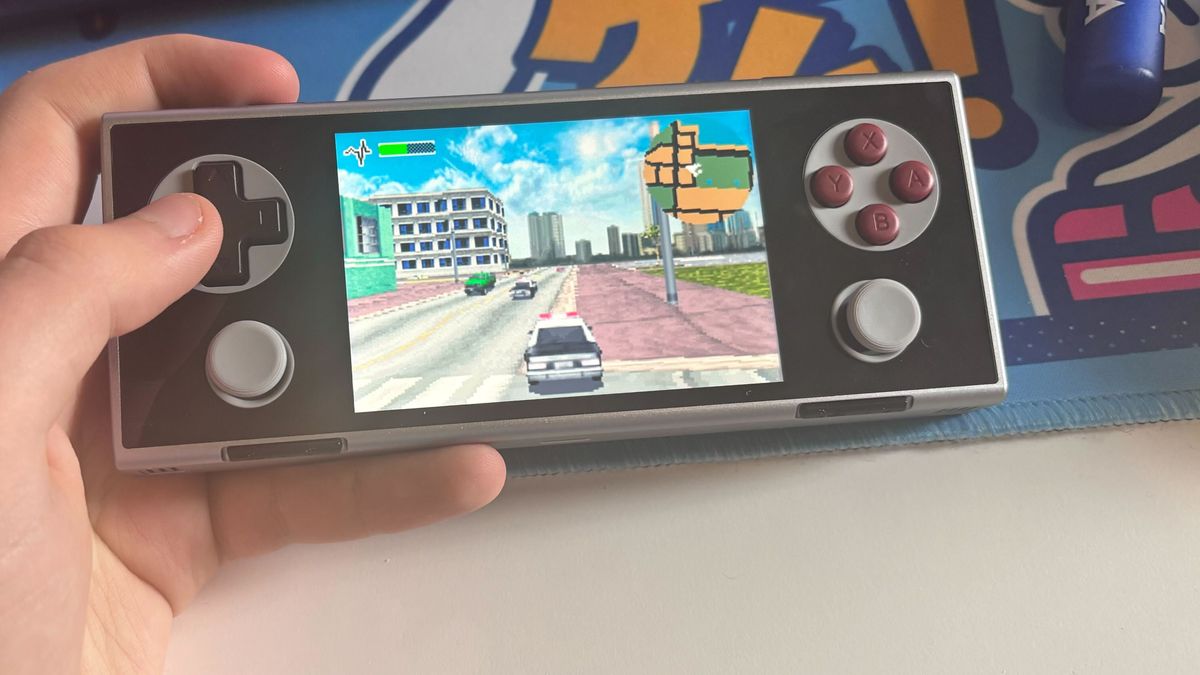Products You May Like
Ayaneo Pocket Micro: One-minute review
The Ayaneo Pocket Micro truly needs to be held in your hands to be believed. It’s an incredibly small Android tablet, weighing under 9oz / 250g and coming in at just 6.1 x 2.5 x 0.71in / 156 x 63 x 18mm, with in-built thumbsticks, D-pad, face buttons, and shoulder inputs. It sports a colorful 960 x 640 3.5in IPS touchscreen75, in a 3:2 aspect ratio that is perfect for playing Game Boy Advance games.
It’s no secret that this has been designed as an emulation handheld first and foremost, as it even comes with a custom Android launcher and Ayaneo app suite useful for importing a wide range of retro games – even if it is a bit jagged and unpolished at times. Links to top emulators on the Google Play Store, plus the easy-to-access microSD card slot, make it surprisingly simple to get a library full of games up and running.
Diving into Game Boy Advance classics like The Legend of Zelda: A Link to the Past and Pokémon Ruby is a treat, thanks in no small part to the wonderfully responsive controls. If you’ve ever tried your hand at mobile emulation, you’ll know that touchscreen inputs feel nowhere near as good as the real thing. The buttons and D-pad here are pleasantly soft, with a spongy feel reminiscent of the Nintendo 2DS. GBA games run perfectly and look sublimely crisp. This even includes more demanding titles that skirted with 3D visuals, like the open-world crime caper Driver 3.
While Game Boy titles are the focus thanks to the size of the display, the Ayaneo Pocket Micro is also capable of emulating a wide range of other systems. Performance does begin to suffer if you attempt anything more advanced than a PSP, however, which is to be expected given the use of the more budget-oriented Helio G99 chipset.
This is also the story with native Android gaming. Simple 2D experiences like Stardew Valley or the Vampire Survivors-like 20 Minutes Till Dawn run superbly, while complex 3D worlds like those in Genshin Impact or Zenless Zone Zero cause frame rates to tumble. It’s also hard to ignore the quality of the speakers which are pretty poor. It’s reasonable to expect these kinds of cutbacks at this price point, but the muddy audio makes headphones almost a necessity even when you’re gaming at home.
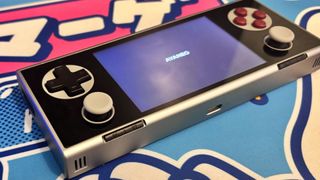
Ayaneo Pocket Micro: Price and availability
- Currently available via IndieGogo
- Prices start at $189 (around £153) via early bird pricing
- Retail prices start at $219 (around £177)
The Ayaneo Pocket Micro is currently only available via IndieGogo.
A basic model with 6GB of RAM and 128GB of storage will set you back $189 (around £153) via early bird pricing, or $219 (around £177) at retail. You can also grab a more premium version with 8GB of RAM and 256GB of storage starting at $249 (around £202) via early bird pricing, or $279 (around £226) at retail. IndieGogo will ship to a wide range of regions, but just bear in mind that prices can vary depending on the current exchange rate.
Multiple colors are available for each version. The more affordable variant comes in a cute red or sleek black, while the more premium model is offered in black or a clearly Game & Watch-inspired gold and maroon.
This price is certainly not a huge amount to pay for an Android tablet, let alone one with a specialist design like this. It is roughly the same price as other modern Game Boy successors, like the premium Analogue Pocket which starts at $129.99 (around £174), so a pretty good value proposition on the whole.
Ayaneo Pocket Micro: Specs
| Price | $189 / around £153 (6GB + 128GB) / $219 / around £177 (8GB + 256GB) |
| Dimensions | 6.1 x 2.5 x 0.71 in / 156 x 63 x 18 mm |
| Weight | 8.21 oz / 233 g |
| CPU | MediaTek Helio G99 |
| GPU | MediaTek Helio G99 |
| Memory | 6GB / 8GB |
| Storage | 128GB / 256GB |
| Storage expansion | microSD Card |
Ayaneo Pocket Micro: Design and features
- Very robust metal shell
- Pleasant buttons and D-pad
- Full Android functionality
When you take the Ayaneo Pocket Micro out of the box, the first thing you’ll probably notice is that it’s built like a tank. I tested an early production sample, but you wouldn’t know it from the quality of the overall feel. It’s constructed using a CNC aluminum alloy frame, lending the outside of the tablet an incredibly robust feel. It seems considerably more sturdy than the likes of the Nintendo Switch Lite, and could probably go head to head with the brick-like original Game Boy in a drop test – though for obvious reasons I wasn’t too keen to test that.
The back of the tablet is plastic, which helps keep the weight at a manageable 8.21oz / 233g. My model came in the black colorway, so the front is a clean black with a bezel-less 3.5-inch screen. To the left of the screen, you will find the well-sized D-pad and left thumbstick. On the right are the face buttons (in the traditional Nintendo layout) and the right thumbstick. Both thumbsticks are very small but are still capable of more than enough motion for 3D gaming.
Underneath all of that, there are two sets of small rectangular buttons. The first set serves as the start and select button in games, while the others are an ‘Aya Button’ (which calls up a floating settings menu) and a button that returns you to the system’s home screen.
On the top of the console, there are four shoulder buttons, a power button with an integrated fingerprint reader (an excellent feature that saves you from having to enter passwords on the tiny little screen), and a simple volume rocker. That’s not all, though, as the console’s flat right side features a dedicated home button and a mappable ‘RC’ button.
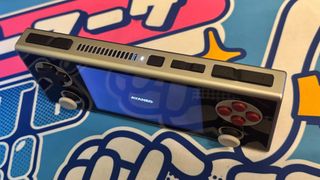
If you want to expand your storage, there’s a microSD card slot on the left-hand side under a little rubber flap. No microSD card is included, so you will need to source your own. I found that it was incredibly tricky to insert a card on my model, as the flap was difficult to open and the card itself just didn’t seem to click into place properly. Thankfully, Ayaneo states that this is a known issue with pre-production versions of the device and should be ironed out by the time you get your hands on one.
As you might expect, there is your usual USB-C port for charging on the bottom of the system.
In terms of overall features, the Ayaneo Pocket Micro is a fully-fledged Android tablet. You can download apps using the Google Play Store, though the small screen will make it difficult to perform tasks like messaging, document editing, and so on. Gaming is definitely where this device shines, and the custom Ayaneo software is designed to ensure a simple gaming experience. Links to recommended emulators (both paid and free) are easy to access from the AyaSpace app and the system’s in-built controls were immediately recognized by every one that I tried.
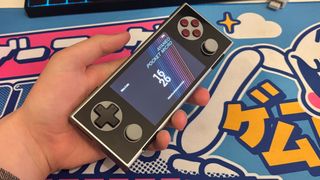
Ayaneo Pocket Micro: Performance
- Perfect for Game Boy emulation
- Also plays basic mobile games
- Speakers are poor
The Ayaneo Pocket Micro excels at Game Boy emulation. Every GB, GBC, and GBA game that I tested ran perfectly. Running at 4x the original Game Boy Advance resolution, the picture is incredibly crisp. While not OLED, the colors of the IPS screen are still very vibrant with great viewing angles that are well-suited to portable play. The screen is also bright enough to be used comfortably outdoors without any glare.
You will begin to encounter some performance issues if you attempt more intensive emulation, however. PlayStation 2 titles are hit-and-miss and I found that the screen size actually made it difficult to work out what was going on in detailed environments like the open world of Grand Theft Auto: San Andreas. PSP games ran acceptably too, but again the screen size made it difficult to read tutorial text in the likes of God of War: Chains of Olympus.
Attempting to emulate more recent consoles results in a stuttery, laggy mess but that’s to be expected given the relatively modest chipset here. This is definitely one to buy if you’re most keen to play Game Boy games.
Unlike a conventional mobile phone, the Ayaneo Pocket Micro has an in-built fan for active air cooling. It can get slightly loud when you crank it up to the maximum power in the settings menu, but it seems very effective at keeping the device cool while you play.
As an Android tablet, the Ayaneo Pocket Micro can also be used for native mobile titles but keep your expectations in check. This is not a high-spec gaming phone, so it’s going to struggle if you don’t stick to the simplest titles. Throughout my testing, I managed to consistently achieve 5-6 hours of battery life which is pretty solid given the tablet’s miniscule size. It should comfortably last for the duration of a commute, where its pocketable nature really shines.
That said, the rectangular shape did start to dig into my palms when I attempted longer sessions. The corners have been rounded off slightly, which definitely helps, but your palms are still going to get sore after a few hours.
There is one bigger problem with the Ayaneo Pocket Micro though: its speakers. They’re very poor, producing a weak, muddy sound that lacks any bass or real clarity. In-game music sounds tinny and sometimes even a little crackly.
It’s not massively noticeable when you’re playing Game Boy titles, as they have relatively limited audio capabilities in the first place, but is incredibly apparent when trying out more modern games. Headphones are an absolute must, which makes the lack of a 3.5mm headphone jack a real shame. Bluetooth is an option, but having to fiddle with headphone pairing is an obstacle every time you want to play.
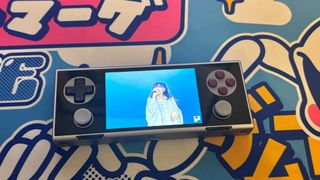
Should I buy the Ayaneo Pocket Micro?
Buy it if…
Don’t buy it if…
Also consider…
After a device like the Ayaneo Pocket Micro? Consider these two alternatives.
| Row 0 – Cell 0 | Ayaneo Pocket Micro | Modretro Chromatic | Nintendo Switch Lite |
| Price | $189 / around £153 (6GB + 128GB) / $219 / around £177 (8GB + 256GB) | $199 / £159 / $AU 316 | $199.99 / £199.99 / AU$329.95 |
| Dimensions | 6.1 x 2.5 x 0.71 in / 156 x 63 x 18 mm | 5.2 x 3 x 1.2in / 132 x 76 x 30 mm | 3.6 x 8.2 x 0.55in / 91.1 x 208 x 13.9mm |
| Weight | 8.21 oz / 233 g | 6.2oz / 175g | 9.76oz / 275g |
| CPU | MediaTek Helio G99 | N/A | Nvidia Custom Tegra X1 |
| GPU | MediaTek Helio G99 | N/A | Nvidia Custom Tegra X1 |
| Memory | 6GB / 8GB | N/A | 4GB |
| Storage | 128GB / 256GB | N/A | 32GB |
| Storage expansion | MicroSD Card | N/A | MicroSD Card |
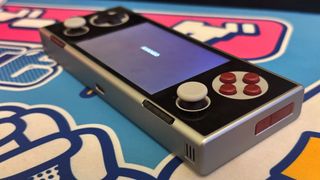
How I tested the Ayaneo Pocket Micro
- Tested for three months
- Played a wide variety of Game Boy games
- Tried at home and out and about
I tested the Ayaneo Pocket Micro over a period of three months. I used the 8GB + 256GB model in its black colorway, accompanied by a case provided by the manufacturer. In addition to the built-in storage, I relied on a SanDisk Extreme microSD card to transfer game files from my PC.
I played a wide variety of Game Boy, Game Boy Color, and Game Boy Advance games on the Ayaneo Pocket Micro. This included Tetris, Pokemon Red, The Legend of Zelda: Link’s Awakening, Wario Land 3, Pokemon Ruby, Driver 3, Metroid Zero Mission, and more. I also tested a small handful of PlayStation, PlayStation 2, and PlayStation Portable games in addition to a few other platforms. I was also careful to evaluate the handheld’s performance in native mobile titles, such as the popular Call of Duty: Mobile.
Throughout my time with the handheld, I constantly compared the playing experience to my hands-on testing of gaming smartphones and a wide range of gaming handhelds. For audio, I relied on a pair of Beats Solo Buds.
First reviewed January 2024.
